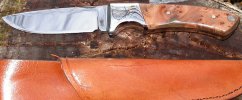Bobby B
No more Mr. Knife-guy
- Joined
- May 18, 2001
- Messages
- 3,053
I have a question about a Boker I got a few years ago. It is similar to the Integral I sold in the US, but I can only find it on the German website. The description is here. The actual knife is the African Thuyia wood version, pictured here.

If my German is correct it says it is forged 440C...??? is this correct? That would be unusual, wouldn't it? I am by no means a knifemaker (or even knowledgeable on the topic ), but I thought one normally didn't forge the stainless steels, at least not as a rule???
), but I thought one normally didn't forge the stainless steels, at least not as a rule???

If my German is correct it says it is forged 440C...??? is this correct? That would be unusual, wouldn't it? I am by no means a knifemaker (or even knowledgeable on the topic

